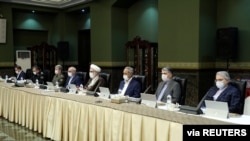Iran's health ministry said Saturday that 123 people had died of coronavirus during the past 24 hours, bringing the total death toll to 1,556, with more than 20,000 people infected.
The ministry stressed that the death toll for the day had dropped from 149 a day earlier.
Some Iranian opposition sources, however, said on social media that there were many more cases and casualties than the government was reporting. VOA could not independently confirm the claim.
Scattered reports on social media and on opposition TV channels appeared to indicate that many Iranians were ignoring government warnings to stay indoors because of the NowrouzIranian New Year festival.
Iranian TV showed volunteers spraying disinfectant near schools, mosques, holy sites and government buildings. Amateur video on social media showed volunteers from Lebanon's Hezbollah going door to door to disinfect people's homes.
President Hassan Rouhani called on the U.S. government Friday to suspend economic sanctions, saying they "endanger the health and well-being of the Iranian people" and "dramatically undermine" their ability to fight the coronavirus.
U.S. Secretary of State Mike Pompeo denied the charge during a Friday press conference with President Donald Trump:
"The whole world should know that humanitarian assistance to Iran is wide open," he said. "It's not sanctioned. We've offered to provide assistance to the Iranians, as well. ... We're doing everything we can to facilitate both the humanitarian assistance moving in and to make sure the financial transactions connected to that can take place as well. There is no sanction on medicines going to Iran."
Former Iranian President Abolhassan Bani Sadr, who lives in exile in France, told VOA, however, that various reports were coming to him that "Iran is indeed unable to buy medicine due to the U.S. economic sanctions" and that Trump needed to take more measures to "help Iran, so that more people don't die." Otherwise, he said, "history won't forgive him."
Bani Sadr said Iran was "suffering from three separate viruses: dictatorship, economic sanctions and the coronavirus." The Iranian government, he said, "was too late to react to the virus and now it finds itself without the means to combat it effectively."








